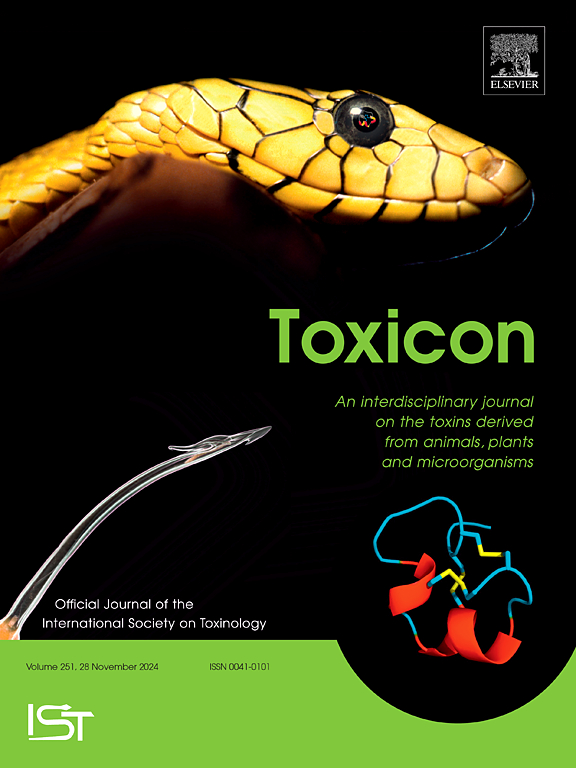Emerging therapeutic applications of scorpion venom peptides in the Middle East and North Africa: A comprehensive review
IF 2.6
4区 医学
Q2 PHARMACOLOGY & PHARMACY
引用次数: 0
Abstract
The predominantly arid and semi-arid climate, with high temperatures and vast desert areas in the Middle East and North Africa (MENA) region, creates a favorable environment for scorpions, resulting in diversity of species of different genera. Animal venom, particularly scorpion venom, poses a health risk to victims who are envenomed. However, its abundance of bioactive protein molecules also makes it a promising source for new drug development. Numerous studies worldwide have revealed that venom-based molecules exhibit diverse therapeutic activities, including anticancer, antidiabetic, antimicrobial, anti-hypertensive, immunomodulatory, and analgesic properties. Researchers from MENA region are also actively contributing to this global challenge. In this review, we will explore the abundance and diversity of scorpions in the MENA region and examine recent studies on the therapeutic activities of molecules extracted from their venom. Nonetheless, additional research is needed to address the challenges of developing effective natural drugs from scorpion venom.

蝎子毒液肽在中东和北非的新兴治疗应用:一个全面的回顾。
中东和北非(MENA)地区以干旱和半干旱为主的气候,高温和广阔的沙漠地区,为蝎子创造了有利的生存环境,导致不同属的物种多样性。动物的毒液,尤其是蝎子的毒液,会对中毒的受害者造成健康风险。然而,其丰富的生物活性蛋白分子也使其成为新药开发的有希望的来源。世界范围内的大量研究表明,基于毒液的分子具有多种治疗活性,包括抗癌、降糖、抗菌、降压、免疫调节和镇痛特性。中东和北非地区的研究人员也在积极应对这一全球挑战。在这篇综述中,我们将探讨中东和北非地区蝎子的丰度和多样性,并检查从蝎子毒液中提取的分子治疗活性的最新研究。尽管如此,还需要进一步的研究来解决从蝎子毒液中开发有效的天然药物的挑战。
本文章由计算机程序翻译,如有差异,请以英文原文为准。
求助全文
约1分钟内获得全文
求助全文
来源期刊

Toxicon
医学-毒理学
CiteScore
4.80
自引率
10.70%
发文量
358
审稿时长
68 days
期刊介绍:
Toxicon has an open access mirror Toxicon: X, sharing the same aims and scope, editorial team, submission system and rigorous peer review. An introductory offer Toxicon: X - full waiver of the Open Access fee.
Toxicon''s "aims and scope" are to publish:
-articles containing the results of original research on problems related to toxins derived from animals, plants and microorganisms
-papers on novel findings related to the chemical, pharmacological, toxicological, and immunological properties of natural toxins
-molecular biological studies of toxins and other genes from poisonous and venomous organisms that advance understanding of the role or function of toxins
-clinical observations on poisoning and envenoming where a new therapeutic principle has been proposed or a decidedly superior clinical result has been obtained.
-material on the use of toxins as tools in studying biological processes and material on subjects related to venom and antivenom problems.
-articles on the translational application of toxins, for example as drugs and insecticides
-epidemiological studies on envenoming or poisoning, so long as they highlight a previously unrecognised medical problem or provide insight into the prevention or medical treatment of envenoming or poisoning. Retrospective surveys of hospital records, especially those lacking species identification, will not be considered for publication. Properly designed prospective community-based surveys are strongly encouraged.
-articles describing well-known activities of venoms, such as antibacterial, anticancer, and analgesic activities of arachnid venoms, without any attempt to define the mechanism of action or purify the active component, will not be considered for publication in Toxicon.
-review articles on problems related to toxinology.
To encourage the exchange of ideas, sections of the journal may be devoted to Short Communications, Letters to the Editor and activities of the affiliated societies.
 求助内容:
求助内容: 应助结果提醒方式:
应助结果提醒方式:


